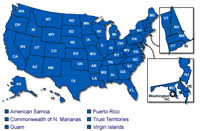National Database
The Agency for Toxic Substances and Disease Registry (ATSDR) is working with other agencies interested in reducing harm from chemical spills to build a national database. The U.S. Department of Transportation, the National Response Center, state health departments, and the media will provide data about toxic spills. As other toxic spill databases become available, they may be added as well. Combining data from several different sources will give a clearer picture of toxic substance incidents in the United States for prevention activities.
National Toxic Substance Incidents Database Webinar
Summary: A national database is helping create a better picture of toxic substances throughout the United States. Learn more about how US and state governments are adding to the knowledge about toxic substance incidents.
Audience: Chemical incident responders and planners.
Providing Information
Estimated data is provided by the Department of Transportation, for transportation and fixed-facility incidents. Estimated transportation data uses a matching ratio derived from a comparison of NTSIP and DOT records in surveillance states and applies that ratio to DOT records in non-surveillance states to get the estimated NTSIP numbers. Estimated fixed-facility data uses a matching ratio derived from a comparison of NTSIP and National Response Center (NRC) fixed-facility records in surveillance states and applies that ratio to NRC fixed-facility records in non-surveillance states to get the estimated NTSIP fixed-facility numbers.
Requesting Information
Anyone, including other federal agencies, state and local officials, emergency responders, and researchers, can use NTSIP information to plan for toxic substance incidents. This planning can help reduce the harm caused by toxic substance spills and leaks by preparing responders. It can even help prevent some toxic substance incidents by educating those who manufacture, transport, use or dispose of toxic substances on safer practices.
People can ask for NTSIP information by e-mailing ATSDRNTSIP@cdc.gov.
- Page last reviewed: March 5, 2014
- Page last updated: February 26, 2014
- Content source:



 ShareCompartir
ShareCompartir
